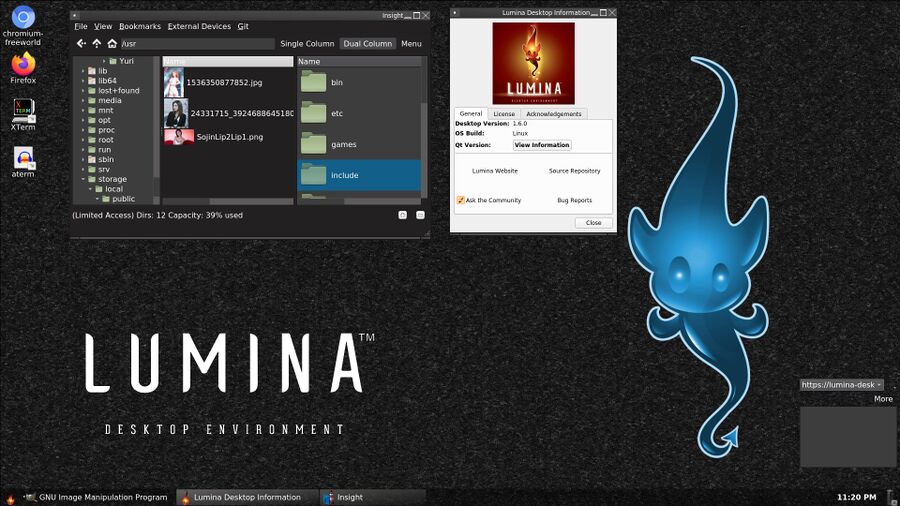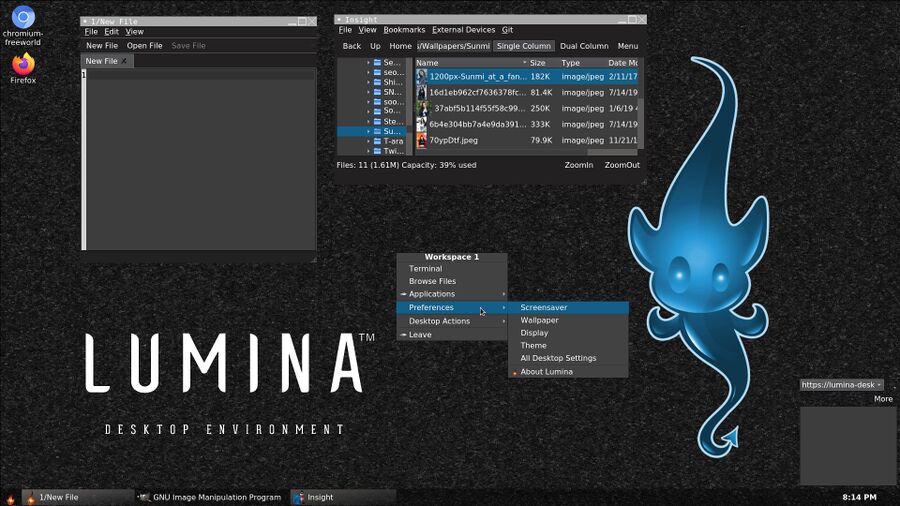Lumina
Lumina is in theory but not in practice a very lightweight desktop environment written in C++ using Qt5. The Lumina desktop environment is made up of a desktop with a toolbar, a file manager, a non-working media player, a simple picture viewer and some configuration utilities. It uses Fluxbox for window management. Lumina does not use any of the common Linux-specific frameworks (systemd, D-Bus, Policykit, etc). Lumina is supposed to be fast and light-weight. It is, in practice, nothing close to "lightweight". It is absolutely not a good choice for weak or limited hardware or any hardware for that matter.
Features And Usability[edit]

The Lumina desktop environment. Version 1.6.
Lumina offers a traditional desktop environment with a desktop capable of holding icons and a wallpaper and a panel with a menu and tray icons and a clock. Right-clicking the desktop brings up a menu from which applications can be launched.

The default Lumina 1.6 desktop environment with its text editor and file manager.
The Lumina desktop environment comes has some desktop specific applications:
- A file manager called "Insight"
- A text editor with basic syntax high-lighting
- A very simple picture viewer (lumina-photo)
- A screenshot tool which binds to {the {key|PrintScreen}} key
- A media player which doesn't actually play anything or work at all
- An archive handler
- A simple search tool
- A theme configuration tool
- A display configuration tool
None of the Lumina applications are very advanced or impressive. They are all really simple and bare-bones.
Performance[edit]
lumina-desktop.org story is that Lumina is a
"Lightweight Desktop Environment. Lumina is designed to have a small footprint, giving your system the best performance possible."
Their story is somewhat true: lumina-desktop uses about 200 MB of memory. A single "Insight" file manager (lumina-fm) window uses 170 MB. However, there are some serious problems with the "the best performance possible" part of the story. First of all: Starting Lumina is painfully slow. Lumina really like to enjoy a relaxing break "Detecting Applications" when it starts up. IceWM and Xfce has much lower startup times.
Actually using the Lumina desktop when it has eventually managed to start is outright painful due to how unresponsive it is. Using the menu is extremely slow and that's a big one usability-wise. It can take up to half a minute from the time you click the menu button to the time it shows up on slower machines. The menu has a search field which eventually brings up a list of some (but not all) the applications that are relevant to what you are searching for. It takes forever before something actually shows up and the whole desktop has a tendency to just freeze while the lumina-desktop process crunches away using one core at 100%.
You can point at the Lumina desktop environment and say "It is so light-weight, it has a very low memory-footprint compared to KDE Plasma and Xfce" with a strait face. That does not mean that it feels light-weight when you use it. It doesn't. Lumina is horribly slow and unresponsive when you use it.
Verdict And Conclusion[edit]
Lumina tries to be a "lightweight" desktop environment and it fails. The basics you expect from a desktop environment, like a menu, are too slow to qualify as light-weight. Its startup time is also horrible compared to both other supposedly light desktop enviroments and desktop environments not claiming to be light. Type your password into your login manager and press ↵ Enter and IceWM is there instantly. Xfce is there within a second. Lumina spends ages doing who knows what before a desktop environment is there, ready to be used.
Lumina's memory footprint may be on the lower side (it does use more than twice as much as IceWM) but that doesn't really help when its performance is so bad it is useless on old and weak hardware and painfully slow on very powerful modern desktop computers.
Lumina does have the "no systemd" (or PolicyKit, ConsoleKit, D-Bus or other Linux-specific technologies) thing going for it for those who really don't like those things. That aspect is not at all impressive once you realize that it doesn't support any of the things those technologies provide.
Lumina is very limited feature-wise. It offers nothing you can't get in the most basic and actually light-weight alternatives like LXQt and IceWM and it performs worse than bigger and "heavier" desktop environments like Xfce. It is not a good desktop environment for people who want a light and simple desktop environment, people with older or weak hardware or anyone else for that matter.
Links[edit]
Lumina has a hompage at lumina-desktop.org.
The source code repository is at github.com/lumina-desktop/lumina.

Enable comment auto-refresher